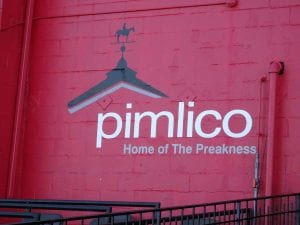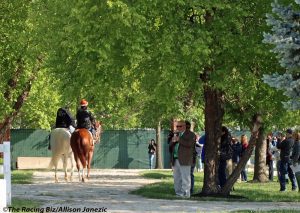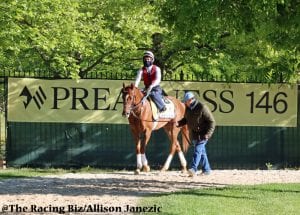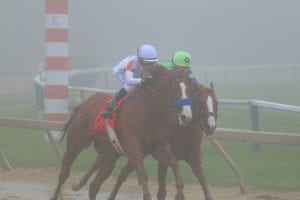Senate panel raises Pimlico Plus bill questions
For advocates hoping that HB 1524, the “Pimlico Plus” legislation, would sail smoothly through the Senate and on to Gov. Wes Moore, Friday’s hearing of the Senate Budget and Taxation Committee wasn’t quite what the doctor ordered.
Instead, Senators peppered the Governor’s chief legislative officer, Eric Luedtke, and Maryland Thoroughbred Racetrack Operating Authority chair Greg Cross with questions and concerns for more than an hour. While many of the issues raised were of the “supportive of the concept but want to drill down on the details” variety, the lateness of the hour – the General Assembly’s 2024 session ends April 8 – may make any tinkering a challenge.
Indeed, at one point, Cross was asked: what’s the hurry? “We are the very last minutes of Pimlico,” Cross replied. “This building is falling down. We need to make the investment.”
HB 1524 would ultimately lead to the closure of Laurel Park, the renovation of Pimlico Race Course, the creation of a new training center, and the replacement of the current private, for-profit ownership model for the racetracks with a new state-owned, nonprofit-managed model under the auspices of the Maryland Thoroughbred Racetrack Operating Authority (MTROA).
It would authorize the Maryland Stadium Authority to issue up to $400 million in bonds to implement the projects. That debt would be serviced primarily by funds from the State Lottery Fund, with the Lottery Fund partially paid back from a variety of sources, including money from Thoroughbred purses, grants received by Baltimore City, and money from the slots-fueled Racetrack Facilities Renewal Account (RFRA).
The bill passed the House of Delegates by a 104-34 margin Monday but had languished in the Rules Committee of the Senate until today, when it was referred to Budget and Taxation.
House opposition to the bill largely focused on how it treats RFRA. Under the 2020 Racing and Community Development Act, the 80% of RFRA targeted to Thoroughbred tracks was dedicated to debt service, with the state’s two harness tracks, Rosecroft Raceway in Fort Washington and Ocean Downs in Berlin, splitting the remaining share. RFRA funds are matching funds and provided on a reimbursement basis. A track operator choosing not to make capital improvements would thus not receive them.
This bill would take Rosecroft’s share of the funds — $4.8 million accumulated but unused and several million additional dollars it would be eligible to use over the coming years until RFRA sunsets in 2033 – and dedicate all of that to the Pimlico Plus project.
CHECK OUT THE LATEST OFF TO THE RACES RADIO!
While the Stronach Group, which owns both Laurel and Pimlico and Rosecroft, supports the move, standardbred interests are less sanguine about it. They point out that a new Rosecroft owner might want to use those funds and also note that, if permitted by the General Assembly, Ocean Downs could use those funds to prepare to absorb cold-weather race days should Rosecroft close.
In today’s hearing, Senators added a number of other concerns. Those include what might happen to the Rosecroft property if the track were to close, the cost of licensing the use of the Preakness intellectual property, and the well-being of the community surrounding Pimlico.
“As this bill makes it way through the bill process, you will some some proposals from the Prince George’s delegation regarding those [RFRA] dollars going forward,” Sen. Michael Jackson (D-Prince George’s) told the bill’s supporters.
Licensing the Preakness is expected to cost the MTROA more than $5 million annually. The deal hammered out between the Authority and the Stronach Group calls for the latter to receive $3 million – an amount that rises 2.5% each year – plus two percent of wagering handle on Black-Eyed Susan day and Preakness day, which would have amounted to about $2.6 million in 2023.
“The alternative [to this licensing agreement] would be to purchase the intellectual property directly, which is extremely valuable,” Luedtke told Senators.
In 2022 and 2023, according to the Stronach Group, Preakness weekend was actually a money-loser for the company. The last time its operations made as much as $5 million in a single year was 2017.
Another issue is whether and to what extent the community around Pimlico will benefit from the work done there. Cross and Luedtke pointed to a new hotel envisioned for the property and the addition of racing days and new workers as ways in which the community will benefit. Some Senators seemed to think there should be more there.
Cross has consistently maintained that he expects the MTROA operation to be profitable, although the Stronach Group said its Maryland operation has been cashflow-negative for every one of at least the last 10 years. He reiterated that in today’s hearing.
“It’s a profitable business. It’s a marginally profitable business,” he said. “We’re at Laurel [in the first couple of years] in a decrepit facility, running it right now, and we show a profit.”
“Help me understand,” one Senator asked Cross. “What do you envision when we talk about profits, and what does the community role look like in that profit-sharing?”
Ultimately, HB 1524 is fairly vague on a number of issues. That didn’t seem to pose much of a problem for the House of Delegates, but it does seem to be a concern for a number of Senators. How they will handle it will determine the bill’s future – which must be decided in days.
PIMLICO PLUS LATEST NEWS















What’s Plan B if it doesn’t get passed today, end of the session.